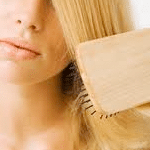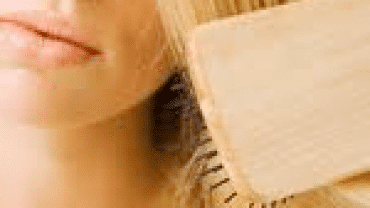 Hair changes during pregnancy are common, although some women don’t notice any obvious changes at all. Some women notice changes beyond their growing belly and various aches and pains, including changes in their hair.
Hair changes during pregnancy are common, although some women don’t notice any obvious changes at all. Some women notice changes beyond their growing belly and various aches and pains, including changes in their hair.
Changes in hair when pregnant can vary widely, some good and some not-so-good. Some fortunate women experience more luxurious pregnancy hair that looks much fuller, thicker and shinier than before, while others may have undesirable changes including hair that appears thinner, more greasy, drier or more brittle. These affects are caused by an increase in the hormone estrogen, as well as increased circulation and blood supply to all areas of the body. In addition, prenatal vitamins help increase the health of your hair and may be contributing to your thicker, shinier mane.
Hair Loss
One major hair complaint in pregnancy is hair loss. Hair loss during pregnancy may be due to hormonal problems, including an overactive or underactive thyroid or a vitamin and mineral deficiency. Hair loss is common during pregnancy and even more so after delivery. The most common time related to pregnancy for hair loss is approximately three months after delivery. This shedding is called “telogen effluvium” and typically lasts less than 6 months, although the duration for hair to return to it’s normal pre-pregnancy density can be affected by many factors including breastfeeding, long-term stress as well as blood loss during delivery. Telogen effluvium affects somewhere between 40- 50% of pregnant women. Genetic thinning may be triggered or heightened after delivery and can result in a slow-thinning of the front hairline. Most hormonal changes that cause hair loss during pregnancy often resolves themselves as the body returns to pre-pregnancy hormone levels.
Healthy Hair
You don’t have to wait until after your new little one is born to have a healthier head of hair. There are a number of things you can do to improve your hair’s condition as well as reduce the extent of damage and hair loss. Taking your prenatal vitamins daily, eating a healthy, well-balanced diet and drinking plenty of water (at least eight 8-ounce glasses per day) may be your best line of defense. For problems with dry hair, use a stronger conditioner and do deep-conditioning often. If your hair is brittle you may want to stay away from the hair dryer and allow it to simply air dry. If you must blow dry your hair or use other heated instruments, use a cooler or lower setting. If your hair is extra greasy, use a mild shampoo and wash it more frequently to get rid of excess oil. Avoid wearing your hair in ponytails, pigtails or braiding it, because it may pull your hair and place added stress on it, causing breakage. Wait until after delivery before perming and coloring your hair if you possibly can, which can damage your hair even further, on top of possibly causing harm to your unborn baby (especially during the first trimester).
Hair Growth
Increased hair growth and thickening may happen on parts of the body other than the head during pregnancy, including the face, arms, legs and even on the abdomen. Body hair in typically male-only spots is called, “Hirsutism” and tends to disappear within 6 months of delivery, although some may hang around longer. To be on the safe side, avoid using depilatories or bleach creams during pregnancy, since they work by using strong chemicals which may not react well with your skin and may also possibly seep into your skin; being absorbed into your bloodstream. There haven’t been any studies to show whether these creams are safe or not, which labels them as category C drugs and therefore it’s wise to steer clear of them until after delivery. Plucking and shaving may be your only good options during pregnancy.
